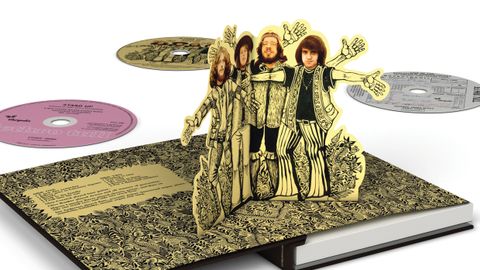Jethro Tull were already on their way to becoming a major band by the time that Stand Up, their second album, was released in September 1969. Moving on from the blues rock sound they’d initially made their name with, Stand Up sees Ian Anderson definitively taking on the role of band leader and core songwriter, while also bringing new folk and proto-progressive influences to the party. We’re still some distance from the lyrical acidity and barnstorming musicality of their classic 70s material, but there’s fire already burning in their bellies here.
Opening track A New Day Yesterday is a last hurrah for the old Tull. It’s the blues as a blunt instrument, with a stuttering, crunching riff that, given Tony Iommi’s brief tenure with the band, is oddly reminiscent of early Black Sabbath. But this is most definitely Anderson’s song, a showcase for that old-before-its-time voice – part agrarian labourer, part country squire – and his unmistakeably raw, attacking style of flute playing. There’s a similar crowd-pleasing swagger to Nothing Is Easy, an energetic, tightly arranged track full of neat embellishments from new boy guitarist Martin Barre that practically bludgeons the listener into submission by the end.
The English pastoral psych of Look Into The Sun and Reasons For Waiting are mellower and more reflective, like lying in the grass on a summer’s evening as the sky slowly turns pink. But even here, Anderson’s apparent vulnerability is tempered by a hint of doubt in his voice or an urgent flute trill – watch out for snakes in that grass, he seems to imply. Even more world-weary, We Used To Know is a masterclass in the mid-paced rock ballad freighted with meaning, its head-nodding vibe and chord sequence later channelled by the Eagles on Hotel California.
But it’s Bourée, their arrangement of a Johann Sebastian Bach lute piece, that’s most indicative of Tull’s unique spirit of mischievous invention. With its walking bass line and teasingly melodic flute, there’s virtuosity, but also a lightness of touch. At the dawn of prog, bands often sought musical respectability by flirting with the classical establishment, but Tull’s approach is more playful and less reverent.
The Elevated Edition of Stand Up is a two-CD/one-DVD set that comes packaged as a hardback book complete with the pop-up artwork from the original gatefold sleeve. Steven Wilson’s remix brings an added clarity to the sound, but isn’t as revelatory as his work on, for instance, Aqualung and A Passion Play. Extras include a Top Gear session and a Swedish concert from January 1969 that features unrecorded tracks.


